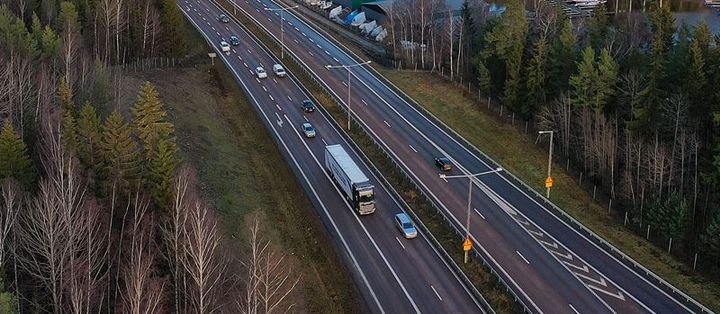Scania has been granted permission by the Swedish Transport Agency to test self-driving trucks on the E4 motorway between Södertälje and Jönköping. The tests will occur in collaboration with TuSimple, which is a leader in the development of autonomous vehicles and a key partner in Scania’s and TRATON group’s investment in this field.
The trucks will enter commercial service with the Scania Transport Laboratory and will be loaded with goods for Scania’s production operations. The tests will cover technology according to level 4 on the 5-point SAE scale for self-driving vehicles, which means that the trucks are driven autonomously but for safety reasons are supervised by a driver. A test engineer will also be on board during Scania’s tests with the task of monitoring and verifying the information which is transmitted to the truck from the sensors that enable autonomous driving.
“In both the US and China, tests are already underway of trucks according to Level 4 on public roads, but as far as I know Scania is the first in Europe to test the technology on a motorway and with payload,” says Hans Nordin, who is responsible for the Hub2hub project.
Later this year, Scania plans to expand the tests to cover the entire route between Södertälje and Helsingborg.
“In the coming years, we also expect to be able to test the technology in other European countries and in China,” says Nordin.
Scania has been testing self-driving trucks for mining transportation in Australia since 2017.
“The experience gained from these tests shows that autonomous vehicles can become a reality in just a few years for transportation in closed areas such as mines and terminals,” says Nordin.
According to Nordin, so-called Hub2hub transportation – driving on the motorway between reloading centres – is the first kind of transportation on public roads where self-driving trucks can become a reality.
“We have come so far in the development of self-driving vehicles that the technology may be ready to be introduced to the market already within the next five years for this type of transportation. However, it will take longer before autonomous vehicles for driving on roads with two-way traffic and in urban environments becomes a reality,” concludes Nordin.
Scania’s partner TuSimple – with its headquarters in San Diego, US, and with facilities in Tucson, Shanghai and Beijing – since its foundation in 2015 has carried out millions of kilometres of tests on motorways to develop the self-driving technology for automation level 4. The company is currently considered to be the leader in the field.
Forest Machine Magazine is a dedicated forestry news channel. It is written and edited by a forest professional with over 40 years hands on experience. We are dedicated to keeping you informed with all the latest news, views and reviews from our industry.
To support us you can subscribe to our bi-monthly magazine which is delivered to your door from only £30 per year.
Subscribe here
#homeoflogging #writtenbyloggersforloggers #loggingallovertheworld





